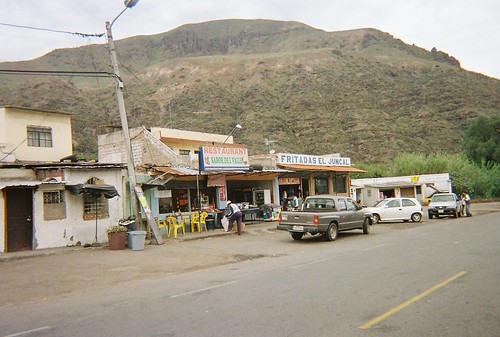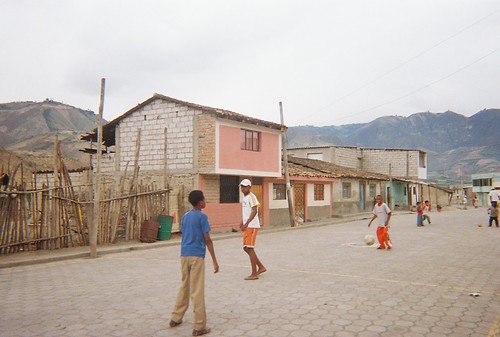Valle de Chota, Ecuador, more commonly known as “Chota.”
Why Communication is So Important!
Why Communication is So Important!
Valle de Chota, or Chota, as it's commonly called in Ecuador had been on my list of places to visit since Team Ecuador's soccer team made it's impressive showing in the 2006 World Cub games. Over half the players from this highly touted team were from Chota, Ecuador's Black community up in the Andes Mountains with a population of about 2000 residents. It was not until three years later when I arrived in this community by bus, and encountered a rather chilly reception.
The fact that I was a total stranger entering a town cold; a town where everyone knew each other, and the fact that I was speaking Spanish with a funny accent made a lot people nervous. One shop owner went to get the police. I wished I could have taken her picture of the way she wagged her finger and shook her head as if to say, “don’t be bringing your touristy ass up in here!” Instead, I ended up taking pictures of the police officers at the police station as I explained to them that I'm from the US and that I'm a hearty fan of Ecuador's international soccer team. The officers must have felt my positive energy because they became cheerful and flattered. As a peace offering, I gave them each one of my Barack Obama post cards and an Oakland post card. I found this gesture to be very much appreciated by people I connected with throughout my Latin American travels.
As
I walked around, I could see people eyeballing me and cutting their eyes at me wondering who I was and what the hell I wanted in this town. There is nothing for tourist here, and that is exactly why I came. I'm a cultural explorer, not a tourist. The only touristy thing I've done in my visits to nine Latin American countries was visit the equator, which by the way, is how Ecuador got it's name; it's Spanish for equator, and the equator runs right through Ecuador. I got my picture taken with one foot in the northern hemisphere and one foot in the southern. That's it!
I did manage to meet a couple of friendly families, answering their questions and explaining that I wanted to see the very soccer field that produced so many Afro-Ecuadorian stars, such as Augustín Delgado, who before his retirement was revered in Ecuador the way Shaquille O'Neitl was revered in the US before his retirement. As I continued to walk around and take pictures, I came across a group of youth, future soccer stars, honing their soccer skills in the middle of the street the way New Yorkers play stickball, a makeshift version of baseball, in the middle of the street.
Finally, I stopped at a local shop to buy a beer. The woman behind the counter seemed frightened and intimidated the minute she heard my foreign accent. However, there were three young men hanging around the shop who engaged me in conversation. They explained to me that since the World Cup games, there have been other tourist passing through. That gave me the impression that this quiet, peaceful little town did not care for strangers from strange lands dropping in. They simply were not used to it, nor were they prepared for it. These young men felt better about my
presence as we continued our chat. They asked me questions about the US and the African-American community. They answered my questions on their community and their soccer stars. Even the woman who nervously served me the beer was not so spooked after all; she too became relaxed and welcoming.
When I left Chota, I felt so exhilarated to have to met and chatted with friendly men, women, and children as they expounded on information that had been intriguing me for the last three years. They invited me to hang out with them that evening when people would begin partying, and that way, I can get a better feel for their culture. This is a solid example of how communication with an open mind can go a long way in breaking down barriers among people who are different. It makes no difference who we are or where we are. Toastmasters International tells us that communication skills are not negotiable. Let me take it a step further; communication, period, is not negotiable.
I did manage to meet a couple of friendly families, answering their questions and explaining that I wanted to see the very soccer field that produced so many Afro-Ecuadorian stars, such as Augustín Delgado, who before his retirement was revered in Ecuador the way Shaquille O'Neitl was revered in the US before his retirement. As I continued to walk around and take pictures, I came across a group of youth, future soccer stars, honing their soccer skills in the middle of the street the way New Yorkers play stickball, a makeshift version of baseball, in the middle of the street.
Future world class soccer stars in a pick-up game.
When I left Chota, I felt so exhilarated to have to met and chatted with friendly men, women, and children as they expounded on information that had been intriguing me for the last three years. They invited me to hang out with them that evening when people would begin partying, and that way, I can get a better feel for their culture. This is a solid example of how communication with an open mind can go a long way in breaking down barriers among people who are different. It makes no difference who we are or where we are. Toastmasters International tells us that communication skills are not negotiable. Let me take it a step further; communication, period, is not negotiable.


So this trip took place in 2009 and now in 2012 you decide to post?
ReplyDeleteYou state: "When I left Chota, I felt so exhilarated to have to met and chatted with friendly men, women, and children as they expounded on information that had been intriguing me for the last three years."
But then provide not ONE grain of information about what information you learned from these people. Was that not the purpose of the post? :/
Hi Rio,
DeleteThanks for dropping by. The purpose of the post was to address the value of communication. Too many people around the world get very uptight when they meet someone from a different culture they are not accustomed. Once the lines of communication opened, people felt better about my presence and invited me back, thanks to communication.
Good story, patience can be a very good thing. Admittedly, I would have been very put off by their response and left. But I can now see their viewpoint.
ReplyDeleteYes, blackAndy, under normal circumstances I would have been put off and left too. However, I traveled a long distance to see this community, and I was not going to walk away so fast. LOL.
Delete